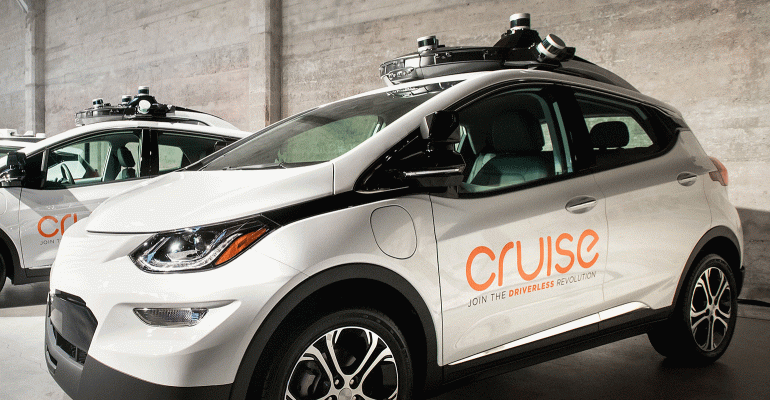It’s only three days into the new year, and our restaurant industry tech predictions are already coming true.
DoorDash, one of the nation’s leading third-party delivery operators, announced plans to test autonomous vehicle (AV) deliveries in San Francisco. The company is partnering with General Motors-owned Cruise Automation, which has DMV permits for testing 180 vehicles in California.
The pilot program will begin in early 2019 with one vehicle, at first. The intention is to ramp up with “several more” self-driving vehicles within the first six months, DoorDash told Nation’s Restaurant News.
DoorDash, which works with such restaurant chains as Chipotle Mexican Grill, Jack in the Box and Subway, has declined to name brands participating in the Bay Area pilot.
“At this time, we are not disclosing San Francisco businesses that will be participating in the test,” the company said.
Though the cars are self-driving, they won’t be empty.
During the trial, DoorDash said a company Dasher, or driver, will be a passenger so he or she can bring the delivery order to the door of the consumer. The test includes delivery of ready-made restaurant meals, as well as groceries from supermarket chains that are already partnered with DoorDash.
“As the partnership progresses, we will seek to have customers opt-in to receiving an autonomous vehicle delivery at the curb,” DoorDash said. “Part of the testing phase of this partnership will include learning best user interactions for the customer to retrieve their food from the vehicle.”
Cruise CEO Dan Ammann, named in late November, said partnering with San Francisco-based DoorDash will give the company “critical learnings” from its fleet of self-driving vehicles.
“Delivery is a significant opportunity for Cruise as we prepare to commercialize our autonomous vehicle technology and transform transportation,” Ammann said.
The fleet is based on the Chevy Bolt EV with each car equipped with 10 cameras that take pictures at 10 frames per second. Cruise anticipates launching commercially later this year, spokesman John Taylor said.
Tony Xu, CEO of DoorDash, said the company is excited to be a leader in testing this type of technology.
“We see autonomous vehicles playing a major role in the future of delivery as consumer behaviors continue to shift online, and we are confident Cruise’s leading technology will help us scale to meet growing consumer demand,” he said in a statement.
Postmates launching robot rovers
DoorDash’s AV announcement comes a few weeks after rival, Postmates, announced its own automation program.

Postmates is deploying Serve, an autonomous delivery rover that is designed to move around sidewalks, instead of roads.
Serve, developed in-house, can travel up to 30 miles carrying as much as 50 pounds on a single charge. The company said Serve is expected to augment its more than 4 million deliveries each month, especially in hard-to-navigate urban areas with traffic congestion.
“Ultimately, we believe that there will be a world where goods move rapidly at almost zero cost to the consumer,” Postmates said.
Serve is expected to navigate public streets in cooperation with local governments to ensure the rover is respecting the public right-of-way, Postmates said. The company said the rover can deliver foods directly to consumers or can collect goods from several merchants and bring them to a centralized location. For the latter, drivers, bikers or walkers can take those batched goods and complete the delivery, Postmates said.

For direct deliveries, consumers will be alerted when they need to go outside to retrieve their order using a unique code to access their delivery using Serve’s touchscreen. Consumers can also unlock their order by using their phone.
Initial testing will begin later this year in the Los Angeles market, the company said. Postmates did not comment when asked which restaurants would be included in the trial.
According to its app, Postmates delivers in downtown Los Angeles from a range of national chains and indie restaurants including Jack in the Box, Chick-fil-A, Urth Caffé, Starbucks, Canter’s Deli, Panini Kabob Grill, Philz Coffee, Toastea and Pressed Juicery.
After the Los Angeles test, the company plans to deploy rovers to other cities over the next 12 months.
By the Numbers: Olo
For any operator in denial about the importance of digital ordering, take a look at some big numbers released recently by Olo.
The online food ordering company told Wedbush analyst Nick Setyan that the company just surpassed 200 million orders, up from 100 million from the prior year in 2017.
“It took the company 12.5 years to reach the first 100 million orders and one year to double that,” Setyan wrote in a report published in mid-December.
Setyan said more than 50 percent of publicly traded restaurant chains are choosing Olo, in part, because the company offers POS integration options with third-party operators such as Grubhub. Olo works with Applebee’s, Chili’s, Chipotle Mexican Grill, Denny’s, Five Guys Burgers & Fries, Jamba Juice, Noodles & Co., Red Robin Gourmet Burgers, Shake Shack, Sweetgreen and Wingstop.
More from Tech Tracker:
Yelp adds new waitlist features for restaurants
Flippy the burger robot moonlights as fry cook
Chick-fil-A adds call button for secondary orders
Contact Nancy Luna at [email protected]
Follow her on Twitter: @fastfoodmaven




